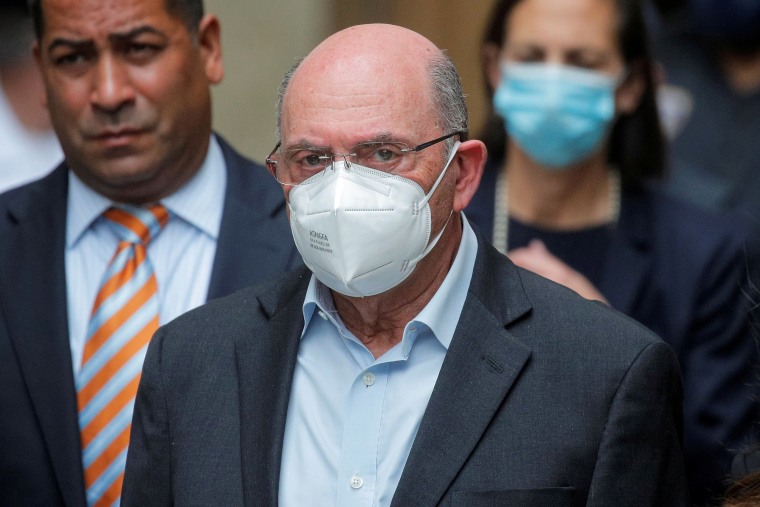On Thursday, Manhattan District Attorney Cyrus Vance formally indicted the Trump Organization and its chief financial officer, Allen Weisselberg. Former President Donald Trump himself was not charged.
To experienced white-collar crime prosecutors, the 15-count indictment felt solid and predictable. Vance is likely looking for additional evidence against Trump. The most important of that evidence would come, in theory, from a Weisselberg guilty plea and subsequent testimony against Trump. But Weisselberg’s indictment alone is unlikely to secure that level of cooperation. Prosecutors undoubtedly shared a draft indictment with Weisselberg’s lawyers before today, and he has so far rebuffed prosecutors’ efforts to flip on his employer. He has pleaded not guilty.
To experienced white-collar crime prosecutors, the 15-count indictment felt solid and predictable.
Weisselberg has apparently calculated that he has little to lose by deferring a decision about cooperating pending a trial and jury verdict against him. He and his lawyers must think they have a decent defense. They may, for example, try to pin blame on Jeffrey McConney, Weisselberg’s lieutenant, who has already testified for Vance’s prosecutors before a grand jury. Or they may think a conviction for tax fraud is unlikely to result in serious prison time.
So if you were looking to join a ticker tape parade in New York celebrating a Trump indictment, best not to book any flight for a while. “Make no mistake — this is not about the law; this is all about politics,” a spokesperson for the Trump Organization told NBC News in a statement.
Still, citizens should be reassured by the care that Vance is evidently taking during this investigative process, and there are some tantalizing details in the indictment.
First, the indictment also alleges a federal tax fraud scheme, inviting federal prosecutors to pursue their charges independent of Manhattan.
Second, the indictment alleges that Weisselberg and “others” directed the 15-year-long scheme to defraud the government. Trump’s former attorney, Michael Cohen, has testified that “nothing went on in Trump world ... without Mr. Trump’s knowledge and approval.”
Third, the indictment alleges that Trump himself signed school tuition checks for Weisselberg’s relatives, a “fringe benefit” that seems hard to explain. (But it certainly appears like a hidden form of compensation that should have been reported.)
It’s no easy thing to convict a prominent defendant. Powerful people have the resources to mount prodigious trial defenses.
Still, it’s no easy thing to convict a prominent defendant. Powerful people have the resources to mount prodigious trial defenses. In Trump’s case, he has a treasure chest available without dipping into his own pockets — he gathered millions of dollars after the 2020 election to help him “stop the steal.”
Celebrity defendants also have committed followers who may find themselves on juries. With Trump, the danger of a true believer who slips into the jury box is certainly real.
Vance should know a thing or two about these dangers, and he has proved himself to be cautious when celebrity is involved — for better or for worse. In In 2015, he declined to prosecute another celebrity defendant, Harvey Weinstein, on a sexual assault case hinging on a single allegation. In 2020, Vance proceeded toconvict Weinstein in a case involvingsix different sexual assault survivors. With that amount of evidence, Vance had an ironclad prosecution.
Trump has of course already renewed his familiar protests, denying any culpability and insisting that he and his company are victims of a “witch hunt.” But the evidence is likely to show that the hoax is in this claim, not in the prosecution.
Even so, there is a fragment of truth to Trump’s claim that he’s been hoisted on celebrity’s petard. Prosecutors often focus their limited resources on matters with maximum deterrent value — cases involving prominent defendants whose convictions are broadcast in the media.
High-profile trials send high-profile messages. That is why after World War II, the United States put enormous effort into prosecuting Nazi war criminals at Nuremberg. “Insider trading” — an investor’s illegally buying or selling of stocks based on nonpublic information — happens every day, but Martha Stewart was convicted for lying to investigators about it. Trump pardoned former national security adviser Michael Flynn and political crony Roger Stone after their widely reported convictions tied to Russia’s meddling in the 2016 election. Now Stone is in hot water again, with the United States filing suit to collect over $1 million it says he owes in federal income taxes, interest and penalties.
Big picture: Trump isn’t out of the woods yet. And Vance’s indictment of the Trump Organization and its CFO is a key first step on a path to full accountability.


